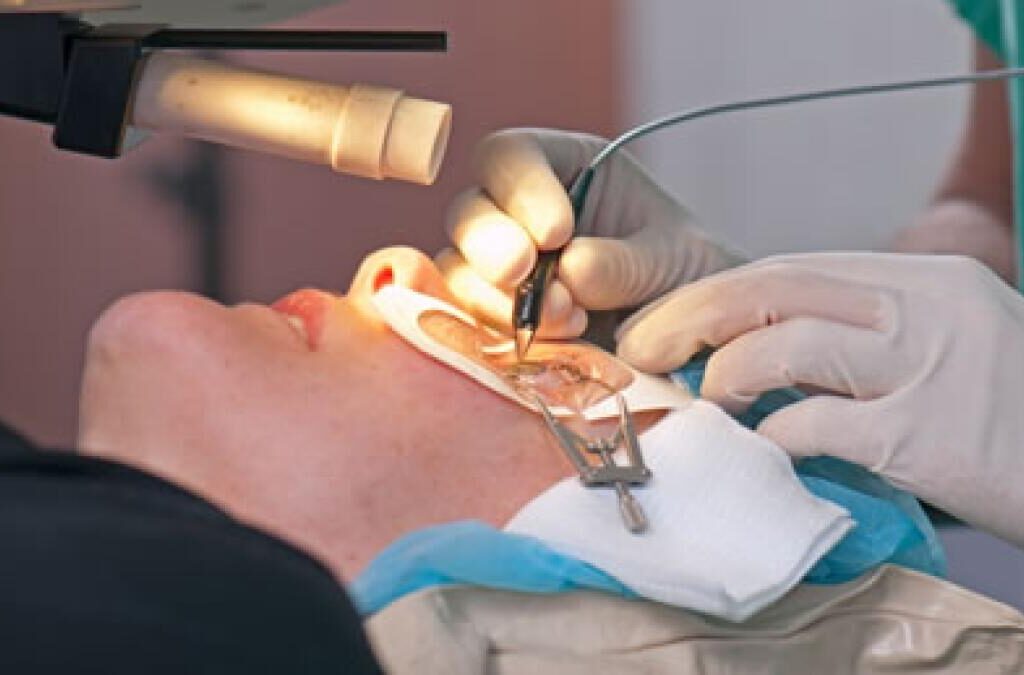Laser eye surgery has become an increasingly popular option for those seeking to improve their vision. If you’re considering this procedure, it’s essential to have a thorough understanding of what it entails, including the science behind it, the different types available, as well as the potential risks and benefits. In this complete guide, we will walk you through everything you need to know about laser eye surgery.
Understanding Laser Eye Surgery
Laser Eye Surgery is a procedure that uses a laser to reshape the cornea, the clear front part of the eye, in order to correct refractive errors such as nearsightedness, farsightedness, and astigmatism. By altering the shape of the cornea, laser eye surgery aims to improve the eye’s ability to focus light onto the retina, resulting in clearer vision.
The Science Behind Laser Eye Surgery
At its core, laser eye surgery works by using the precision of a laser to reshape the cornea. The laser emits pulses of light energy, which are absorbed by the cornea, causing microscopic amounts of tissue to be removed. This reshaping of the cornea allows for better focusing of light, resulting in improved vision.
One of the most widely used lasers in laser eye surgery is the excimer laser, which emits ultraviolet light at a specific wavelength. This light is precise enough to remove extremely thin layers of corneal tissue without generating heat or causing damage to the surrounding area. The excimer laser’s ability to reshape the cornea with such accuracy is what makes laser eye surgery possible.

Different Types of Laser Eye Surgery
There are several types of laser eye surgery procedures available, each catering to different refractive errors and individual needs. The most common types include:
- PRK (Photorefractive Keratectomy): In PRK, the laser removes the outer layer of the cornea, allowing for reshaping of the underlying tissue.
- LASIK (Laser-Assisted In Situ Keratomileusis): LASIK involves creating a thin flap in the cornea, lifting it to expose the underlying tissue, and reshaping it with the laser. The flap is then repositioned to allow for healing.
- SMILE (Small Incision Lenticule Extraction): SMILE is a newer procedure that involves creating a small incision in the cornea to remove a lenticule of tissue, reshaping the cornea without the need for a corneal flap.
Your ophthalmologist will recommend the most suitable procedure based on your specific eye condition and requirements.
The Evolution of Laser Eye Surgery
Laser eye surgery has come a long way since its inception. The first laser eye surgery procedure, called PRK, was approved by the FDA in the 1990s. Since then, advancements in technology and techniques have revolutionized the field.
One significant advancement was the development of the femtosecond laser, which replaced the mechanical microkeratome blade used in creating the corneal flap for LASIK. The femtosecond laser allows for greater precision and fewer complications during the procedure.
Additionally, the use of wavefront-guided technology has enabled surgeons to tailor laser eye surgery to each individual eye, further improving visual outcomes and reducing the occurrence of side effects.
Another noteworthy development in laser eye surgery is the introduction of topography-guided treatments. This technology uses detailed mapping of the cornea’s shape to guide the laser in reshaping the cornea, resulting in even more precise and customized outcomes. Topography-guided treatments have shown promising results in patients with irregular corneas or those who have previously undergone unsuccessful laser eye surgery.
Furthermore, researchers are continuously exploring new techniques and technologies to enhance laser eye surgery. One area of focus is the use of femtosecond lasers for the entire procedure, eliminating the need for the excimer laser altogether. This approach has the potential to further improve safety and accuracy, as well as reduce the overall duration of the surgery.
As laser eye surgery continues to evolve, it is important to consult with a qualified ophthalmologist who stays up-to-date with the latest advancements and can provide personalized recommendations based on your unique needs and goals. Read more about latest advancements at https://urbeuniversity.edu/blog/the-future-of-universities-embracing-technological-advancements-and-evolving-education
Preparing for Laser Eye Surgery
Before undergoing laser eye surgery, it is crucial to properly prepare yourself both physically and mentally. This includes:
Initial Consultation and Eye Examination
During your initial consultation, your ophthalmologist will assess your eligibility for the procedure by conducting a comprehensive eye examination. This examination will evaluate the overall health of your eyes, measure your refractive error, and identify any potential issues that may affect the outcome of the surgery.
But what exactly does a comprehensive eye examination entail? Well, it involves a series of tests that go beyond just checking your visual acuity. Your ophthalmologist will carefully examine the structures of your eyes, including the cornea, retina, and optic nerve. They will also measure your intraocular pressure to rule out any signs of glaucoma. This thorough evaluation ensures that your eyes are in optimal condition for the laser eye surgery.
It is essential to be honest and open during this consultation, informing your ophthalmologist of any pre-existing medical conditions, medications you are taking, and your expectations for the procedure. This information will help your ophthalmologist determine if you are a suitable candidate for laser eye surgery.
Risks and Benefits of Laser Eye Surgery
Like any surgical procedure, laser eye surgery carries both risks and benefits. Understanding these risks and benefits can help you make an informed decision.
Let’s delve a bit deeper into the potential risks. Dry eyes, for example, can occur temporarily after the surgery, but your ophthalmologist will provide you with eye drops to alleviate any discomfort. Glare and halos around lights are also possible, especially at night, but these visual disturbances usually subside within a few weeks as your eyes heal. Temporary fluctuations in vision are another risk, but they typically stabilize as your eyes adjust to the changes made during the surgery.
On the other hand, the benefits of laser eye surgery are quite remarkable. Imagine waking up in the morning and being able to see clearly without reaching for your glasses or putting in contact lenses. The convenience and freedom that come with improved vision can be life-changing. Not to mention the long-term cost savings of not having to purchase glasses or contact lenses regularly. It’s like investing in your vision and reaping the benefits for years to come.
Cost and Financing Options
The cost of laser eye surgery can vary depending on factors such as the type of procedure, the surgeon’s experience, and the location of the clinic. It is crucial to discuss the cost and available financing options with your ophthalmologist during your consultation.
While laser eye surgery may seem like a significant investment, many individuals find that the long-term benefits outweigh the initial cost. The freedom from glasses or contact lenses, the convenience in daily activities, and the improved quality of life make it a worthwhile investment. Additionally, some clinics offer financing plans to make the procedure more affordable for patients, allowing you to spread out the cost over time.
So, as you prepare for laser eye surgery, remember to have an open and honest discussion with your ophthalmologist, weigh the risks and benefits, and consider the long-term value it can bring to your life. With proper preparation and a knowledgeable ophthalmologist by your side, you’ll be well on your way to achieving clearer vision and a brighter future.
The Laser Eye Surgery Procedure
The laser eye surgery procedure is relatively quick and straightforward. The following outlines the typical step-by-step process:
Step-by-Step Process of Laser Eye Surgery
- Anesthetic Eye Drops: Before the surgery begins, anesthetic eye drops are applied to numb the surface of the eye, ensuring a painless procedure.
- Corneal Flap Creation (If Applicable): If you are undergoing LASIK or a similar procedure, a corneal flap will be created using a femtosecond laser or a mechanical microkeratome.
- Laser Reshaping of the Cornea: The excimer laser is used to remove a pre-determined amount of corneal tissue, based on the measurements taken during your pre-operative assessment.
- Corneal Flap Re-positioning (If Applicable): If a corneal flap was created, it will be carefully repositioned and smoothed back into place.
- Post-Operative Care: After the procedure, you will be given instructions on how to care for your eyes during the healing process. This typically includes using prescribed eye drops and avoiding activities that may strain your eyes.
Post-Surgery Expectations and Recovery
After laser eye surgery, it is normal to experience some discomfort, such as itching, burning, and mild pain. The majority of patients report an improvement in their vision within the first few days following the procedure. However, it is essential to follow the post-operative instructions provided by your ophthalmologist to ensure a smooth recovery and optimal results.
During the recovery period, it is crucial to attend all follow-up appointments with your ophthalmologist. These appointments allow your surgeon to monitor your healing progress and address any concerns or complications that may arise. To learn more about recovery click here.
Life After Laser Eye Surgery
Once you have recovered from laser eye surgery, you can enjoy a life with improved vision. However, it is important to consider the long-term effects and take steps to maintain your visual health.
Long-Term Effects and Considerations
While laser eye surgery can provide lasting improvement in vision, it’s essential to understand that your eyes can still undergo changes over time. Factors such as aging, eye conditions, or other health issues can impact your vision in the future.
Regular eye exams and follow-up appointments with your ophthalmologist are crucial to monitor any changes in your eyesight and address any potential issues early on.
Maintaining Your Vision Post-Surgery
To maintain the best possible vision after laser eye surgery, it is important to practice good eye health habits. This includes protecting your eyes from harmful UV rays by wearing sunglasses, avoiding smoking, maintaining a healthy lifestyle, and following a balanced diet rich in vitamins and minerals beneficial for eye health.
If you experience any changes in your vision or have concerns about your eyesight post-surgery, it is essential to contact your ophthalmologist for further evaluation. Timely intervention can help prevent the progression of any potential issues and preserve your visual acuity.

Frequently Asked Questions About Laser Eye Surgery
Here, we address some common concerns and misconceptions individuals may have regarding laser eye surgery.
Addressing Common Concerns and Misconceptions
- Can laser eye surgery completely eliminate the need for glasses or contact lenses?
- Is laser eye surgery painful?
- What is the minimum age requirement for laser eye surgery?
These are just a few examples of the many questions individuals may have when considering laser eye surgery. It’s important to consult with your ophthalmologist to receive accurate information and personalized answers based on your unique circumstances.
Expert Answers to Your Laser Eye Surgery Queries
At [Clinic Name], we understand that the decision to undergo laser eye surgery is a significant one. To help ease any concerns or uncertainties you may have, our team of experts is here to provide answers to all your queries. We encourage you to schedule a consultation, where we can address your specific questions and guide you towards making an informed decision about laser eye surgery.
In Conclusion
Laser eye surgery has become an increasingly popular option for individuals seeking to improve their vision. Understanding the science behind the procedure, the different types available, and the potential risks and benefits is crucial for making an informed decision. By properly preparing for the surgery, following the post-operative instructions, and maintaining good eye health habits, you can enjoy the benefits of laser eye surgery and achieve long-lasting visual improvement. Finally, consult with an experienced ophthalmologist to have all your questions answered and receive personalized guidance throughout your laser eye surgery journey.
Know more

